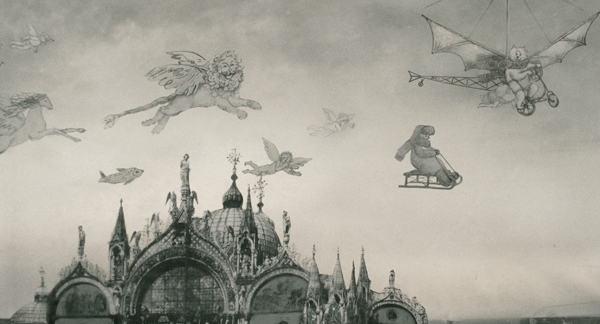|
Reviews of Recent Independent, Foreign, & Documentary Films in Theaters and DVD/Home Video

A ROOM AND A HALF
The kaleidoscope of forms indeed works well. Director Andrey Khrzhanovsky moves pointedly from black and white to dated, sepia-colored film stocks, and from simplistically animated bits involving cats and birds to more technically advanced sequences, like one in which musical instruments float along the streets and canals of an otherwise austere Leningrad. This nostalgic alternative to the anxiety of the latter-day Stalin era—one in which a young Brodsky’s most significant memory of the dictator’s death is kowtowing to the floor during choir practice and stealing an opportunity to ogle his teacher’s backside—offers little insight into the concerns of the time, but rather into the comforts of home, no matter how cramped. Ostensibly, the film is at times an absurdist telling of the Nobel Prize-winning Brodsky’s turbulent life, who was internally exiled for political reasons to a labor camp in the Archangelsk region. He was eventually expulsed in 1972 (for reasons left ambiguous in the film) and became an American citizen and later the poet laureate in 1991. In the same breath, Khrzhanovsky imagines extraneous events that didn’t actually happen, such as a sea voyage home after the collapse of the Soviet Union to the newly re-anointed St. Petersburg to visit his dying parents (who, in actuality, he never saw again after his exile). As a young writer, Brodsky was an outspoken advocate of cultural diversity—an affront against the Soviet leadership’s mass ethos. “Culture can’t be mass by definition,” goes another of the ghostwritten narration, echoing the anti-establishment mindset of the 1960’s rock-and-roll generation. Brodsky’s university years are portrayed through several deliberately pedantic discussion sequences that cleverly pay homage to breakthrough filmmakers of the same era, Godard not least among them. These sections provide some important political detail and foreshadow the kind of cultural warfare apparent throughout the Cold War. Despite his public outspokenness, Brodsky’s writing has often been called apolitical, but, in fact, his work is part of the same freethinking trend that was so often quelled during this time. Just when the politics begin to get heated, though, Brodsky’s expulsion is made permanent, and he is reduced to sending sentimental dispatches home to his mother and father. Over a bad long-distance phone connection, his mother laments the idea that Joseph is eating lobster (in Russia this delicacy is akin to a cheap, unfavorable dish). While providing a moment of levity and appealing to the same homey comfort that appears throughout the film, this reinforces the mother’s notion of Soviet insularity: The citizens of the West are unhappy in their decadent and materialist society. The familiar foundation of domestic comfort is most important. His parents
remain alone in their apartment with scant else but their memories, and
from here the film becomes a bit mawkish. The pair, who through a
neat directorial trick remain the same age throughout the entire film
(and even watch the same TV program endlessly), haven’t seen their
only child for decades. They become the focus of the film’s last act as
Brodsky makes his slow, dreamlike pilgrimage home. And at the end of 130
minutes, the audience may also become nostalgic for the vibrancy of Brodsky’s
wartime childhood—an interesting, if unintentional, effect. Watching the
older poet reminisce is, in comparison, rather bland.
Michael Lee
|

